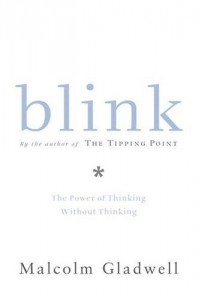 “Blink†by Malcolm Gladwell is one of those books that attract you from the very start, even though the cover of the “#1 National Bestseller†is quite plain.
“Blink†by Malcolm Gladwell is one of those books that attract you from the very start, even though the cover of the “#1 National Bestseller†is quite plain.
What’s interesting, though, is the fact that “Blink†is all about those momentary judgments we make every day, which could either benefit or ruin us.
There were so many works written on the power of our subconscious, the exploration of our unconscious and so on. “Blink†is an entertaining version of such books, as it tells you several interesting stories. Gladwell talks about different experiments people tried out, many of which prove that the judgment made upon the first glance, in other words, those that are rooted in our unconscious, are very likely to be the right ones. It is that kind of gut feeling that you get before you decide not to get on a plane that will later crash.
In many of Gladwell’s stories, people’s immediate impressions are proven to be right. Just as an expert knows looking at a work of art whether it is real or fake, we all have this ability to get the gist from the first sight. However, sometimes we suppress this “inner voice†and let our logical thinking prevail. It is not always a bad thing, but Gladwell argues that very often the more we know, the worse it gets. It is almost like a computer memory: if you overload it with files, pictures and music, it will work slower and freeze all the times.
Though immediate judgments are helpful, in most cases, sometimes they work against us. It happens because of certain prejudices we may not realize we have, which are often based on race or gender. An interesting example is auditions for orchestras. There were times where women were believed to play musical instruments poorly, compared to men, especially if dealing with traditionally “masculine†instruments like trombone. Until there were screens covering a musician from the maestros making a decision, women were seldom hired for orchestras. Gladwell suggests that realizing that we do have unconscious prejudices may solve a lot of our social and personal problems.
Even though it is addressing serious problems and talking about scientific experiments, Gladwell’s book is entertaining. His stories amaze you, make you exclaim, “Oh my God, I can’t believe it,†and make you think about things you used to take for granted, like your unconscious instincts and moves. His vocabulary is not scientific; it is understandable for any audience, and his stories flow naturally, so the book is easy to read.
To sum it all up, simple as its cover, “Blink,†nevertheless, hides a deeper meaning in it. Started from a first glance, the interest you have for the book will lead to hours of logical thinking, analyzing and coming back to certain chapters, so if you are ready to open the secrets of your unconscious or at least are curious about it, be sure that “Blink†is a worthy investment. It is one of those books that you may want to read more than once.

Leave a Reply